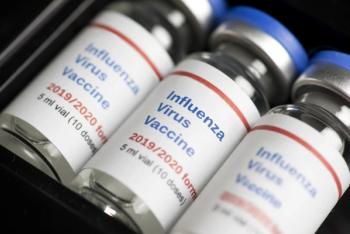
Researchers found that physicians may have a financial conflict of interest when examining a chest x-ray for black lung disease, suggesting that sweeping changes are needed to avoid biases and improve transparency.

Skylar is an associate editor for The American Journal of Managed Care® (AJMC®) and The Center for Biosimilars®, and joined AJMC® in 2020. She is responsible for covering all aspects of the ever-changing global biosimilar industry and produces content that is accessible and informative for all health care stakeholders.
She has a BA in journalism and media studies from Rutgers University. You can connect with Skylar on LinkedIn.

Researchers found that physicians may have a financial conflict of interest when examining a chest x-ray for black lung disease, suggesting that sweeping changes are needed to avoid biases and improve transparency.

Two therapeutic regimens used for the treatment of chronic obstructive pulmonary disease (COPD) are rarely being prescribed to patients without a COPD diagnosis, investigators concluded.

Exposure to nitrogen dioxide (NO2), an air pollutant generated from automobiles, may increase risk of mortality, even if the exposure amount is well below regulatory limits, investigators concluded.

Largely driven by hospitalizations and medications, health care costs were found to be 3 times greater for patients with chronic obstructive pulmonary disease (COPD) than for healthy individuals, according to a recent Danish study.

Investigators found 10 main themes characterizing the differences between primary care clinics classified as high- and low-performing in distributing diabetes care.

A study of Korean patients with chronic obstructive pulmonary disease (COPD) found that a paradoxical response to short-acting bronchodilators may reduce lung function and quality of life.

A recent study found that a sizable portion of the commercially insured asthma population lacks disease control, regardless of asthma severity, signaling a needed shift in treatment strategies.

Despite patients with pulmonary arterial hypertension reporting good quality of life and low symptom severity, functional limitations persisted, suggesting improvements to the patient experience are needed, according to researchers.

Patients with chronic obstructive pulmonary disease (COPD) with clinically important deterioration were found to have greater exacerbations and mortality risks; however, triplet therapy could help rectify that.

Spinal muscular atrophy treatment Zolgensma was found to be safe and effective for long-term use and use in presymptomatic patients, according to posters presented at the 2021 MDA Virtual Clinical & Scientific Conference.

Patients discharged from hospitals after recovering from severe COVID-19 were found to have lasting functional impairment and post-traumatic stress symptoms months after, according to a study.

After Medicare Part D plans stopped covering a chronic obstructive pulmonary disease (COPD) therapy, patients had gaps in care and increased out-of-pocket costs, according to a recent study.

Results of a survey depicting the ways that spinal muscular atrophy (SMA) affects the lives of adolescents and young adults revealed areas of support that need to be addressed to ensure that patients are able to live their best possible lives.

Researchers analyzed 2 cohorts of patients with chronic obstructive pulmonary disease (COPD) to characterize who is most at risk for developing hypercapnia and who could most benefit from at-home noninvasive inhalation therapy.

Telerehabilitation programs for chronic obstructive pulmonary disease (COPD) have to address uptake barriers surrounding inadequate funding and access issues for elderly patients in order to last in a post–COVID-19 world, according to researchers.

Female patients and those under age 50 have a greater risk of severe asthma exacerbations and a lower health-related quality of life, despite having better lung function compared with male and older patients.

Although 90% of patients with severe asthma choose to continue using a biologic, patients with worse disease control at baseline or with lower socioeconomic status (SES) may be more likely to cease biologic use, according to a poster presented at the American Academy of Allergy, Asthma & Immunology 2021 Annual Meeting.

Despite receiving specialty referrals and multiple prescriptions medications, nearly 40% of patients with an unexplained chronic cough are not given a proper diagnosis.

Study results show that patients with chronic obstructive pulmonary disease (COPD) and comorbid asthma may have a greater risk of hospitalization from COVID-19 if they use bronchodilators or steroids plus bronchodilators.

Researchers found that thousands of patients with chronic obstructive pulmonary disease (COPD) did not follow the traditional trajectory associated with the disease, suggesting a possible incorrect diagnosis.

From 1999 to 2015, permanent disability claims for patients with rheumatoid arthritis (RA) spiked during periods of economic recessions, suggesting that the COVID-19 pandemic may create a similar effect in the near future.

Results from the AIRFLOW-1 study demonstrate that targeted lung denervation did not produce any severe adverse reactions in patients with chronic obstructive pulmonary disease (COPD) after 3 years.

A recent study found that patients immunized against influenza were less likely to test positive for or have serious complication related to coronavirus disease 2019 (COVID-19).

Pulmonary function increased during sleep for patients with chronic obstructive pulmonary (COPD) receiving a triple-therapy regimen, but improvements to quality of life remain to be seen.

Advocates for patients with progressive multiple sclerosis (MS) want changes in study designs on emerging therapies to speed development and better align with the needs of researchers and patients.

Changes in temperature and atmospheric pressure were found to be associated with higher rates of medical care utilization for patients with chronic obstructive pulmonary disease (COPD) and asthma.

Living far from a hospital did not increase risk of in-hospital mortality, according to a recent study among veteran populations with chronic obstructive pulmonary disease (COPD).

A recent study found that the proportion of patients in the Netherlands with chronic obstructive pulmonary disease (COPD) who are being assessed for cardiovascular (CV) risk does not align with Dutch guideline recommendations.

Patients with mantle cell lymphoma (MCL) who discontinue acalabrutinib may have different outcomes depending on why they stopped and their eligibility for other therapies.

The prevalence of pulmonary embolism in certain hospitalized patients with chronic obstructive pulmonary disease (COPD) may be lower than previous research suggests, according to a recent study.

259 Prospect Plains Rd, Bldg H
Cranbury, NJ 08512
© 2025 MJH Life Sciences®
All rights reserved.
